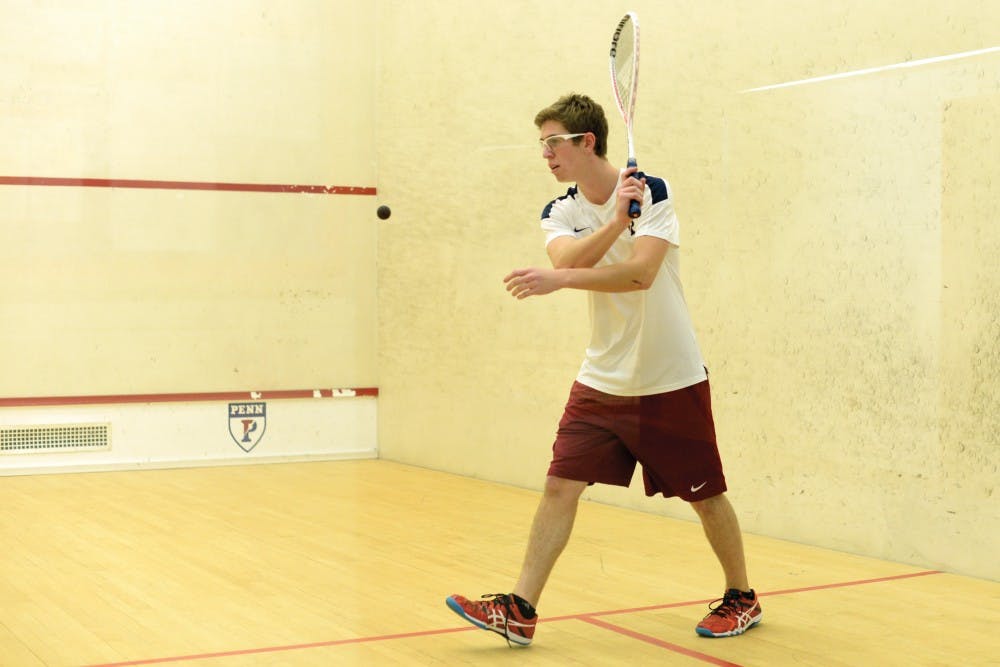If there was one takeaway from Penn squash’s recent triumph in the Battle for 33rd Street it’s this: They’re coming.
The women cruised to a 9-0 victory while the men narrowly eked out a 5-4 nail-biter last Wednesday. The final score may not reflect it, but the Red and Blue’s coaches have taken notice of Drexel’s rapid improvement.
Long regarded as the little brother to the much more experienced Quakers' squad next door, the Dragons have begun to lay the foundation as the next non-Ivy team to break out the way Trinity has.
The story at Trinity was simple: In 1995, two years after Paul Assaiante took over coaching duties, then-President Evan Dobelle took the coach aside to discuss how to improve the squash program.
Assaiante highlighted the abundance of talent abroad and was given the green light by Dobelle to use the school’s resources to bring the international talent to their campus in Hartford, Conn.
Just four years after that conversation, the Bantams broke through and became just the second school outside the Ivy League to ever win the Potter Cup. Trinity would go on to win the next 11 national championships and compile a 252-match winning streak that still stands as the longest ever in collegiate sports.
While the Dragons may not be ready to rattle off 250 straight wins just yet, their fledgling program has already begun to stake its claim as the next big thing.
Much like Trinity, their current president, John Anderson Fry, has shown a commitment to building a formidable squash program. Fry took over as chair of the US Squash board of directors in 2014 and has quickly made a name for his school in the squash world.
The annual U.S. Open of squash has been hosted on Drexel’s campus since 2011, and the university has recently inked a deal with U.S. Squash to keep the tournament at the school through 2023.
Fry has also made sure to extend his benevolence to the varsity squads as well. The Dragons fielded their first varsity teams in 2011 and selected John White, a former world first-ranked player, to head the team.
“[Fry] has made squash a priority at Drexel,” Penn coach Jack Wyant said. “If the president makes it a priority, there’s a good chance that team will be successful.”
Drexel has also extended their recruiting reach outside the borders of the United States. Of the 26 players who make up both varsity squads, there are 15 international players representing 11 different countries. For comparison, the Bantams field 37 players representing 14 different countries.
Fry’s efforts have been rewarded with plenty of success in the nascent career of his varsity teams. In just five years, the men have ascended to No. 9 in the country and are knocking on the door of the Potter Cup draw while the women have moved up to no. 13 as they chase their first berth in the Howe Cup draw.
“The fast rise is something you would expect,” Wyant added. “The squash team is following the lead that the university is taking with its upward mobility.”
The Red and Blue now find themselves in a precarious position. They know that the Dragons are on the cusp of breaking through, but there’s nothing that they can really do to stop them.
“It’s scary,” said sophomore Hayes Murphy, Penn's No. 4 on the ladder. “It definitely keeps us sharp.”
Wednesday’s win keeps Drexel at bay for another year, but the Quakers must continue to improve if they want to keep them in their rear view mirror.
Right now, both Red and Blue squads sport a perfect 5-0 record against the Dragons; if the current trend continues, slaying the Dragons will become a more daunting task.









